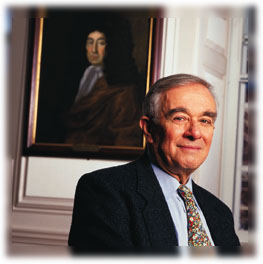Main Menu · Search · Current Issue ·Contact ·Archives ·Centennial ·Letters to the Editor ·FAQs
 Photograph by Stu Rosner |
Are we prepared for the new genetic and reproductive technologies? Everett Mendelsohn, Jf '60, Ph.D. '60--professor of the history of science, Phi Beta Kappa Teaching Award winner, the proactive, new master of Dudley House and improver of the lives of graduate students--was asked to address that topic at a February meeting in London of people from government, science, and industry. "The answer to the question," he says, "is both yes and no, but basically no." Mendelsohn studies the history of the biomedical sciences. He has focused recently on the growth of knowledge about how to make "better" people and on the waxing and waning of what he calls the "eugenic temptation." The common assumption is that today, in some center for human reproduction, research is being done, probably using discarded ova, on how to clone humans. "I wonder," says the historian, "whether we will gather up the wisdom, and with it something of the courage, not to let the technical potential for accomplishing something drive us ahead of a hard look at the consequences." Mendelsohn has never confined himself to the ivory tower. For the past 20 years, working with the Quakers or the American Academy of Arts and Sciences, he has gone at least once a year to the Middle East to join discussions between Arabs and Israelis and to help produce reports on such matters as how to negotiate Jerusalem's place in an Israeli-Palestinian agreement. "I made a commitment to myself as an 18-year-old," he says, "when I discovered I was a pacifist, to devote some portion of my time from there on out to making the world a better place to live."